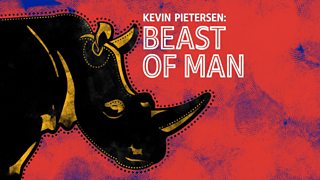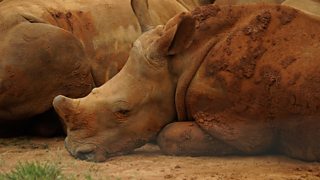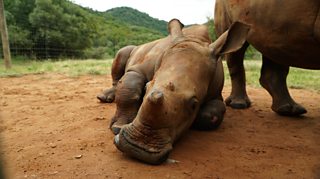The scale of the problem
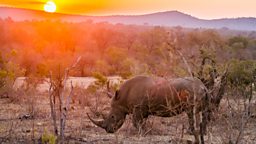
It has been called 'the rhino war' - the ceaseless battle to save the species from poachers and extinction. But just how in danger are they?
There are now around 5,500 black rhino and 18,000 white rhino left in the world – the majority of which live in South Africa.
Estimates suggest there are five species of rhino in total – the other species are the Javan rhino (69 left in the world), the Sumatran rhino (fewer than 80 left) and the greater one-horned rhino (at least 3,500 left).
The last Javan rhino in Vietnam – which is where a large amount of illegal rhino horn is traded – . It was shot and killed, with its horn removed by a poacher.
South Africa faces the biggest problem in terms of poaching for rhino horn.
Most of the world’s remaining rhinos live in South Africa. Most illegal activity occurs in Kruger National Park, a huge protected habitat the size of Wales that borders Mozambique.
Until 10 years ago, the poaching of rhinos was a relatively small problem. In 2007, 13 rhinos were killed by poachers in South Africa. By 2014, that number was 1,215, according to the South Africa Department for Environmental Affairs.
However, figures from Save the Rhino show that in one decade, more than 8,300 African rhinos have been lost to poaching.

Is the problem getting worse?
In the last few years, the number of rhinos being poached has gone down slightly: there were 769 recorded poaching incidents in South Africa in 2018, compared to 1,028 in 2017 according to the South African Department of Environmental Affairs.
However, charities say this doesn’t mean that rhinos are thriving.
Two rhinos are still killed every day. According to Save the Rhino International, the cumulative impact of the poaching crisis and a ‘prolonged drought affecting food and water resources’ means the future of the rhino remains uncertain.

What鈥檚 being done about it?
Part of the issue is the temptation for people in local villages near the Kruger National Park to make money from rhino horn.
With the issue of unemployment... [poaching] is a quick buck"Trudie Grove-Morgan, local councillor
Trudie Grove-Morgan is a local councillor in an area next to the national park.
"The issue of poaching is very vast," she said.
"The community that is situated around the Kruger park is very rural and most of the people there are not educated - and with the issue of unemployment, people tend to employ them to do the poaching for them.
"So it’s a quick buck. To 'be something', they resort to poaching, and that’s the biggest challenge.”
"Some other cities have drugs. Here the drug is poaching. They see their friends having big cars and houses, so they go for it."

Local villages are often targeted for poaching by larger criminal networks that smuggle the rhino horn out of South Africa to parts of Asia.
It鈥檚 a 24-7 dangerous job. You can walk into poachers around the next tree"David, ranger monitor
Rangers are employed within Kruger National Park to protect the rhino from all poachers - but there are also rangers guarding private lands.
David heads a control room that monitors rangers via cameras and infrared equipment.
During the making of the podcast, Kevin Pietersen took 5 Live presenter Sarah Brett to see it.
Sarah asked how they would support a ranger who’s surrounded by a group of poachers.
"By show of force," David said. "You go in with vehicles, you go in with a helicopter, you just make sure at the end of the day that you give the guy all the support you can.
"But all these guys are trained - they do carry firearms. It’s a 24-7 dangerous job. You can walk into poachers around the next tree."

What are the other challenges?
Rhino horn is now reportedly more valuable than cocaine, heroin or gold.
During undercover filming a few years ago, a 成人论坛 journalist was offered rhino horn for $6,000 for 100 grams – that’s about £4,500.
Rhino horn is trafficked across the world and involves multinational criminal gangs. Efforts are being made to try and stop this illegal trade.
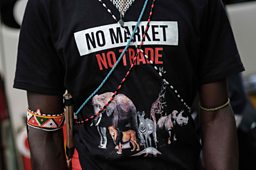
Vu Thi Quyen is executive director of the NGO Education for Nature-Vietnam:
Rhino horn is also now advertised commonly on Facebook and other social media platforms"Vu Thi Quyen, Nature-Vietnam
“ENV and the government in Vietnam and other organisations are working hard on taking down the kingpins and the major criminal networks from African countries that smuggle rhino horn and ivory into other countries.
"Last year we had a number of sting operations.
"We have informer networks from African countries to Vietnam and we work closely with law enforcement around these countries to try to interrupt these criminal networks.
"Rhino horn is also now advertised commonly on Facebook and other social media platforms, so we set up sting operations working with law enforcement to take down these people as well."
Whilst it’s impossible to know how much the entire black market in rhino horn is worth, it’s a complex issue facing governments worldwide.
Interested in knowing more about the criminal gangs and networks that trade illegally in rhino horn? Click here.
Want to hear more? Download the podcast
-
![]()
Trailer: Kevin Pietersen: Beast Of Man
The rhino. An icon, all but extinct. A maverick who never backs down says he鈥檒l save them. It鈥檚 raw. It鈥檚 war.
